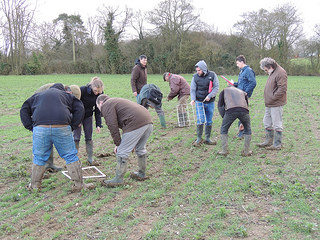
The leading scientific journal Nature has highlighted the importance of research designed by and for farmers as crucial to the success of farming across the world. The Nature article, published on Thursday 1 May 2014, says that a ‘sustainable supply of food hinges on agricultural innovation, but current investments neglect a key area for improving yields’.
The article Agriculture: Engage farmers in research by Soil Association Director of Innovation, Tom MacMillan and Professor Tim Benton of the UK’s Global Food Security programme and professor of population ecology at the University of Leeds, suggests that the current trend of small-scale agricultural innovation could be fundamental to the sustainable farming solution that food and farming policy-makers and scientists agree we need.
The authors say that advances from existing research are slowing: ‘yields have plateaued in some of the world’s most important food-producing regions, including east Asia (for rice) and northwest Europe (for wheat). In some countries, yields have declined’. They go on to say that the next wave of innovation ‘must be at smaller scales’, and ‘Enhancing farmers’ own R&D could reap big rewards for minimal extra cost’. The paper recognises that: ‘Farmers everywhere are practical experimentalists who understand the idiosyncrasies of their land’, and that ‘Such essential contributions are rarely recognized in official assessments of agricultural R&D’.
Indeed the authors put the value of this contribution at a staggering $4 trillion – based not on the estimate that farmers invest around 3–11% of their revenue in R&D, but assuming that globally farmers’ innovations were valued at just 0.5% of farming production.
The article highlights examples of good practice in the field from around the world, including the Duchy Originals Future Farming programme, funded by the Prince of Wales’s Charitable Foundation, in turn funded by sales of products through the supermarket chain Waitrose. The work is led by the Soil Association with the Organic Research Centre as lead research partner and, as the article says, ‘The aim is to help farmers to sharpen their skills as innovators so that they can be more productive with fewer non-renewable inputs — good for the environment and their bottom line’.
The Programme helps farmers work with each other and with researchers to produce healthier food in ways that are better for the environment and farm animals. In addition to the research fund, the programme runs ‘field labs’, which bring a small group of like-minded farmers together to solve a problem, adapting an approach pioneered in developing countries that supports practical DIY research by farmers. So far 450 farmers have taken part in field labs covering 20 topics, and there are 30 more planned for 2014. The farms involved range from under a hectare to more than a thousand. Field labs have tested ways to control black grass (a persistent weed that resists herbicides), assessed the economics of keeping hens alive to lay eggs for a second season, and evaluated ways to reduce use of drugs that control liver fluke in sheep.
The Nature article concludes: ‘we believe that field labs could boost farmers’ productivity by supporting low-cost innovations that fly below the radars of large research institutions. When farmers produce knowledge, they are more likely to adopt new practices, and their insights are more likely to be relevant to local conditions…..The time has come to decentralize, diversify, and enrich agricultural R&D. Farmers – not scientists, outreach workers or salespeople – are the essential players in any agricultural innovation system. Helping them will put food on the world’s tables’.
Read the article here
Listen to the podcast featuring field lab participant and farmer John Pawsey, of Shimpling Park Farm here
